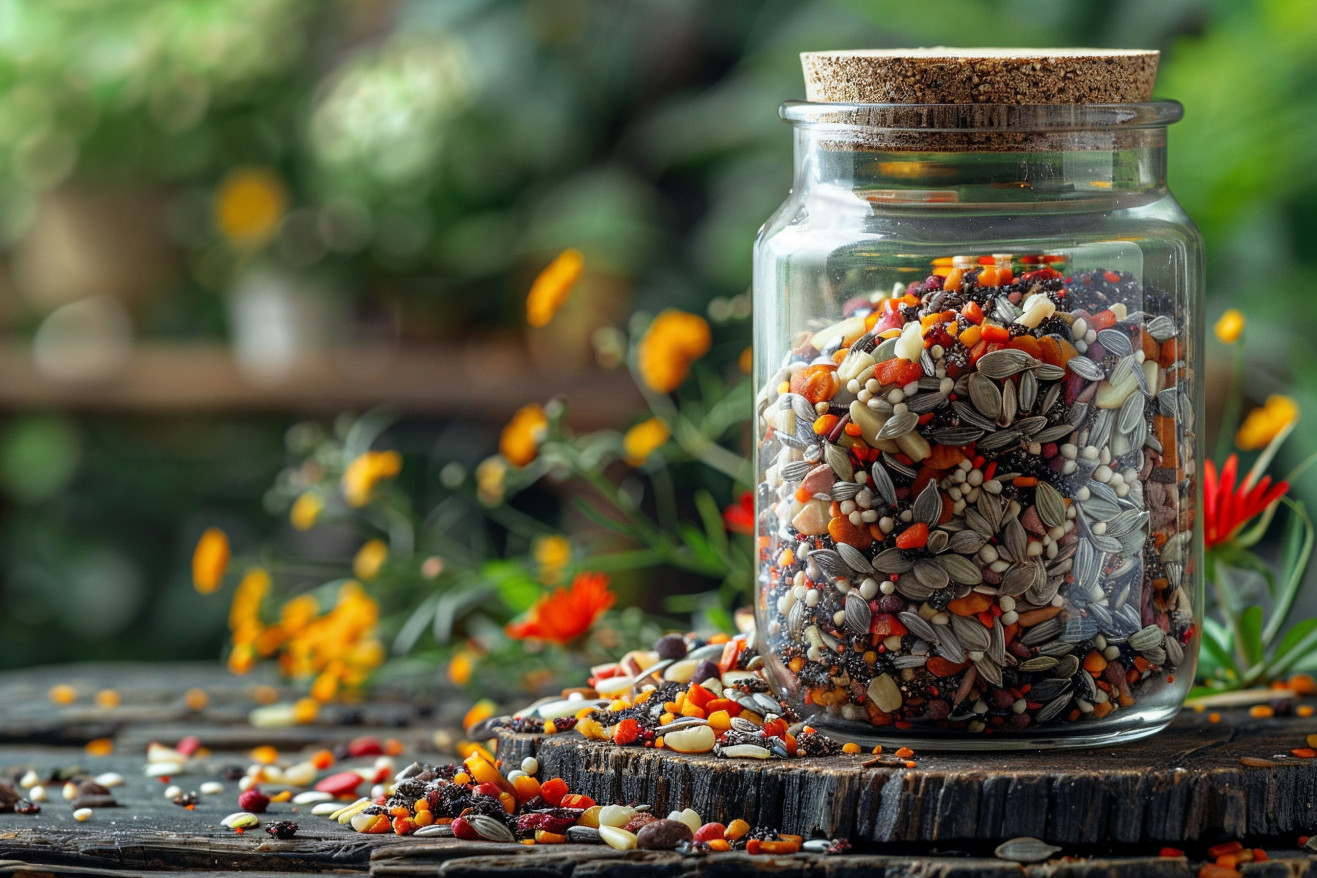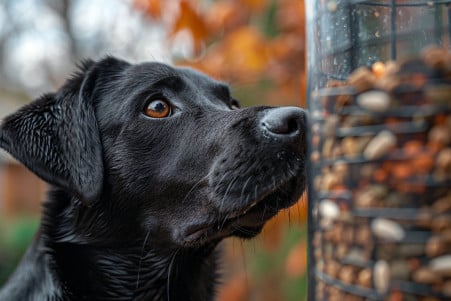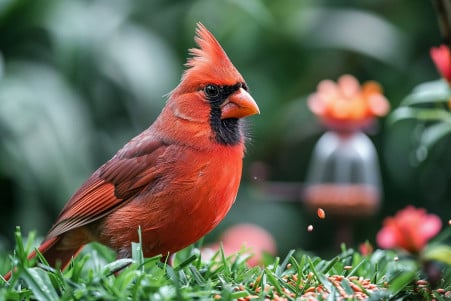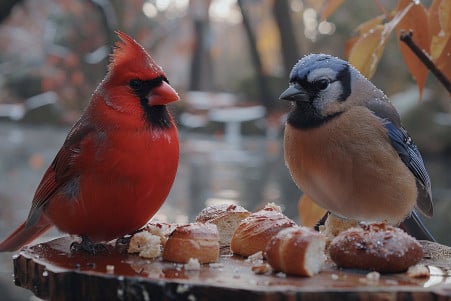Does Bird Seed Spoil? How Long It Lasts and How to Keep It Fresh
30 May 2024 • Updated 30 May 2024

Like any other food, you might think that bird seed would last forever in those big bags, but does it spoil? Bird seed can spoil and go bad, especially if it gets wet and allows bacteria and mold to grow. If it's dried and stored properly, it will last 6 months to a year before the fats start to go rancid. After that, the nutrition degrades and birds won't eat it as much.
To find out if bird seed spoils and how to make it last as long as possible, we'll look into the ingredients and preservation methods of the most common bird seed blends. The studies show that things like temperature, humidity, airflow and packaging all play a role in how long bird seed will last while still being fresh for your birds.
Does bird seed go bad?
Shelf Life Variations: Different Bird Seed Types
Not all bird seeds are created equal, and some will spoil faster than others. For example, ExploreJungleBirds explains that nyjer seed and cracked corn have a shelf life of 3-6 months because they have a higher oil content. Meanwhile, seed mixes that include sunflower seeds, millet, and other dry seeds can last up to a year if stored correctly, according to Thacker Ace Hardware.
Make sure to take a look at the specific seeds in your mix and adjust your storage plan accordingly to keep your bird seed as fresh as possible. AviBirds explains that it's important to understand the diets of the birds you're trying to attract and the seeds they like to eat so you can offer a variety that will appeal to the most species in your area. However, they also suggest storing different types of seeds separately so you can avoid cross-contamination and make sure you're meeting the needs of different birds.
By regularly checking your seed mix and keeping in mind that different seeds have different shelf lives, you can make sure you're offering fresh, healthy food to the birds in your backyard. With the right storage and rotation, you can make sure your bird seed stays fresh for as long as possible.
How to Store Bird Seed to Keep It Fresh
To keep bird seed fresh, it's important to store it in airtight containers to prevent moisture, pests, and contamination, according to How to Keep Bird Seed Fresh. The best containers are made of thick plastic or metal and have tight-fitting lids. According to Chirp Nature Center, the lids should be watertight or have a way to be securely fastened to keep out moisture and bugs.
According to House Digest, these containers should be stored in a cool, dry place out of direct sunlight, such as a garage, shed, or basement. In the summer, Birdseed & Binoculars recommends putting the seed in the freezer to keep it fresh for as long as possible.
To avoid spoilage, Chinridge recommends only buying the amount of seed that you can use within a few months. This way, you can be sure that it's fresh when you put it out for your backyard birds.
How to Tell If Bird Seed Is Bad
You can tell if bird seed is bad by looking for visual signs of spoilage, such as mold, discoloration, clumping, or a slimy texture, according to Kennedy Wild Bird Food & Pet Supplies. Instead of a mild, nutty smell, the seed may have a rancid, musty odor, according to Green Backyard.
Other signs that bird seed has spoiled include insect infestations, stickiness, and sprouting seeds, according to Green Backyard. You can also tell if bird seed is bad by observing whether birds avoid it or become sick after eating it, according to Green Backyard.
Make sure to check stored seed regularly and throw away any that has gone bad, according to The Backyard Naturalist. Moldy or spoiled bird seed can contain toxins that are dangerous to birds, so it's important to dispose of it properly to avoid putting birds at risk.
How to Get Rid of Moldy Bird Seed
Moldy bird seed can be toxic and should be disposed of properly to avoid health hazards, according to Bird Nature. First, make sure to separate the moldy seed from any fresh seed, and then place the moldy seed in a sealed bag or container.
According to Storables, you can safely dispose of the sealed bag of moldy bird seed by throwing it in the trash, outdoor composting (if your compost system can handle moldy items), or controlled burning in a fire pit. However, it's important to never dump bird seed in the wild because it can attract unwanted animals and spread mold and bacteria.
Instead, Bird Nature recommends returning the seed to the store or donating it to local wildlife rehabilitation centers. You can also use the moldy seed for non-consumable purposes, such as creating your own bird feeders or adding it to your compost pile.
How to Keep Bird Feed Fresh
Of course, in addition to buying fresh seed, it's important to keep your bird feeders clean and well-maintained, as noted by Wild Birds Unlimited. This means cleaning your feeders with hot, soapy water to remove any mold or other residue. Birds and Blooms also suggests using airtight containers to store any extra birdseed to keep it from going bad.
You should also make sure to clean up any seed or hulls that have fallen to the ground around your feeders, since they can grow mold and bacteria, according to The Backyard Naturalist. If you have feeders that have removable parts or trays, it can make it easier to keep your feeding area clean and healthy for your birds.
Keeping your feeding area clean is important for the health of the birds that come to your yard. By following these storage and cleaning tips, you can make sure that the birds in your backyard are getting the freshest, healthiest food possible.
Conclusion: How to Make Sure You're Providing a Healthy and Safe Feeding Experience
As seeds are stored, they lose nutritional value due to oxidation. This is why most seed manufacturers place a two-year "shelf life" on their seed mix products, according to BeChewy. This is typically indicated by a "best when used by" date printed on the bag. If a manufacturer packages the seed crop for the current year in nitrogen gas, they can ensure the nutrients will be at the levels listed on the package for two years from the date the package was sealed.
After two years, the embryo and the endosperm in the seeds have likely dried up and died. As BeChewy puts it, "If you feed dead seeds to your birds, you're basically just feeding them filler because there's nothing nutritional left in them."
To check the freshness of seeds, BeChewy recommends breaking one open and looking for oil, or sprouting a sample to see if the seeds will germinate. A high germination rate means the seed mix is still fresh.
Under normal circumstances, seed will remain fresh until it's used, but Wild Birds Unlimited recommends keeping it in a cool, dry place and only buying what can be used in 2-4 weeks to avoid spoilage due to humidity or slow bird activity.
By following proper storage practices and keeping the feeding area clean, bird lovers can make sure they're providing a safe and healthy environment for the birds that visit their yards.


